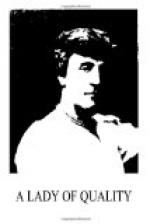“He hath made his way out of England to escape us,” said the angry tailors and mercers—who had besieged his door in vain for months, and who were now infuriated at the thought of their own easiness and the impudent gay airs which had befooled them. “A good four hundred pounds of mine hath he carried with him,” said one. “And two hundred of mine!” “And more of mine, since I am a poor man to whom a pound means twenty guineas!” “We are all robbed, and he has cheated the debtors’ prison, wherein, if we had not been fools, he would have been clapped six months ago.”
“Think ye he will not come back, gentlemen?” quavered his landlady. “God knows when I have seen a guinea of his money—but he was such a handsome, fine young nobleman, and had such a way with a poor body, and ever a smile and a chuck o’ the chin for my Jenny.”
“Look well after poor Jenny if he hath left her behind,” said the tailor.
He did not come back, indeed; and hearing the rumour that he had fled his creditors, the world of fashion received the news with small disturbance, all modish persons being at that time much engaged in discussion of the approaching nuptials of her ladyship of Dunstanwolde and the Duke of Osmonde. Close upon the discussions of the preparations came the nuptials themselves, and then all the town was agog, and had small leisure to think of other things. For those who were bidden to the ceremonials and attendant entertainments, there were rich habits and splendid robes to be prepared; and to those who had not been bidden, there were bitter disappointments and thwarted wishes to think of.
“Sir John Oxon has fled England to escape seeing and hearing it all,” was said.
“He has fled to escape something more painful than the spleen,” others answered. “He had reached his rope’s end, and finding that my Lady Dunstanwolde was not of a mind to lengthen it with her fortune, having taken a better man, and that his creditors would have no more patience, he showed them a light pair of heels.”
Before my Lady Dunstanwolde left her house she gave orders that it be set in order for closing for some time, having it on her mind that she should not soon return. It was, however, to be left in such condition that at any moment, should she wish to come to it, all could be made ready in two days’ time. To this end various repairs and changes she had planned were to be carried out as soon as she went away from it. Among other things was the closing with brickwork of the entrance to the passage leading to the unused cellars.
“‘Twill make the servants’ part more wholesome and less damp and draughty,” she said; “and if I should sell the place, will be to its advantage. ’Twas a builder with little wit who planned such passages and black holes. In spite of all the lime spread there, they were ever mouldy and of evil odour.”




